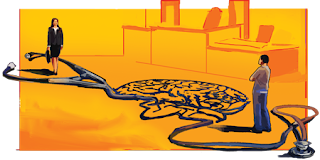In the words of John Henry Wigmore, cross-examination is “beyond any doubt the greatest legal engine ever invented for the discovery of truth.”
3 Wigmore, Evidence §1367, p. 27 (2d ed. 1923)
Don’t accept a substantially flawed psych report. Get the report dismissed!
Unfortunately, psychiatrists, neuropsychologist, and psychologists often write reports for the courts that are substantially flawed. When you get one of those reports, the first hurdle is to figure out if the doctor did a good job in writing their report or if the report contains fatal errors that could warrant the dismissal of that report by the Trier of Fact. This newsletter will discuss five steps to determine if the report is substantially flawed and should be thrown out.
Before proceeding to a discussion of the five steps referred to above, it is imperative that the attorney decide to attack the diagnosis, which is invariably the most vulnerable part of the doctor’s report. It is almost never a good idea to attack the doctor’s conclusions about causation, the Global Assessment of Functioning (GAF) score, apportionment, temporary or permanent disability and/or treatment recommendations without first questioning the doctor about their diagnosis. The reason being that those conclusions are left entirely to the doctor’s subjective opinions while the doctor’s diagnostic conclusions are not left to their subjective opinions. Instead, the doctor’s report should contain substantial medical evidence demonstrating the plaintiff or applicant meets the diagnostic criteria for the disorder found in the American Psychiatric Association’s Diagnostic and Statistical Manual of Mental Disorders. The bottom line is that the attorney should focus their efforts on challenging the doctor’s diagnosis.
Five steps to determine if the report is substantially flawed and should be thrown out:
Determine if the doctor cited sufficient history to indicate that the patient reported sufficient current symptoms to diagnose the disorder correctly. Be sure to determine that the history is complete with data about each complaint’s qualitative nature, frequency, intensity, duration, onset and course over time.
Determine if there are sufficient data in the doctor’s report of their Mental Status Examination (MSE) to support their diagnoses. A MSE should contain a description of the patient’s appearance and social behavior during the face-to-face interview, observations that have led the doctor to conclusions about the patient’s credibility, narrative statements made by the patient that shed light on any possible psychopathology, observations about the patient’s mood and affect, as well as a discussion of observations obtained by measurements of the patient’s memory, concentration and attention, insight, and judgment.
Determine if there are psychological testing data consistent with the doctor’s diagnoses. Information about the psychological tests can be found in my book, Psychological Evaluations in Litigation, which is available for reading or free downloading at my website (www.drleckartwetc.com). In this regard, an inspection of my book will reveal that most psychological tests are not useful in medical-legal examinations because the first responsibility of any medical-legal evaluator is to determine credibility and most tests do not have measures of credibility.
Determine if the doctor cited any medical records from any mental health professional who agreed with their diagnoses and decide if that doctor’s report(s) were credible.
Determine if the doctor’s report provides information obtained from collateral sources such as the plaintiff’s or applicant’s family, friends and/or business associates that are available at the time of the doctor’s examination and that could possibly support their diagnoses.
Follow these five steps when reading through the doctor’s report. When you find that the doctor’s report lacks substantial medical evidence to support their diagnoses, you can set your sights on getting the doctor’s report dismissed. One plan of action is to cross-examine the doctor, asking questions that will expose the absence of substantial medical evidence in their report. Another option is to draft a trial brief that discusses the report’s lack of substantial medical evidence to support the doctor’s diagnoses. In both cases, the end result will likely be the dismissal of the doctor’s flawed report!
Now, if you are an attorney or an insurance adjuster or supervisor and you suspect you have a substantially flawed psych report, call me for a free analysis and a cost estimate for obtaining an Apricot™. An Apricot™ is a work-product privileged report written for an insurance adjuster and/or an attorney who believes they have a substantially flawed psychiatric, neuropsychological or psychological report that will harm their client’s case. In my Apricots™ I describe all the flaws in non-technical language and discuss the specific techniques and strategy for cross-examining the doctor, providing simple questions designed to expose those flaws during a deposition or trial despite a slippery doctor’s evasiveness. Those same Apricots™ are frequently used to write trial briefs, petitions, and appeals. Call me at 844-444-8898 or email DrLeckartWETC@gmail.com.

